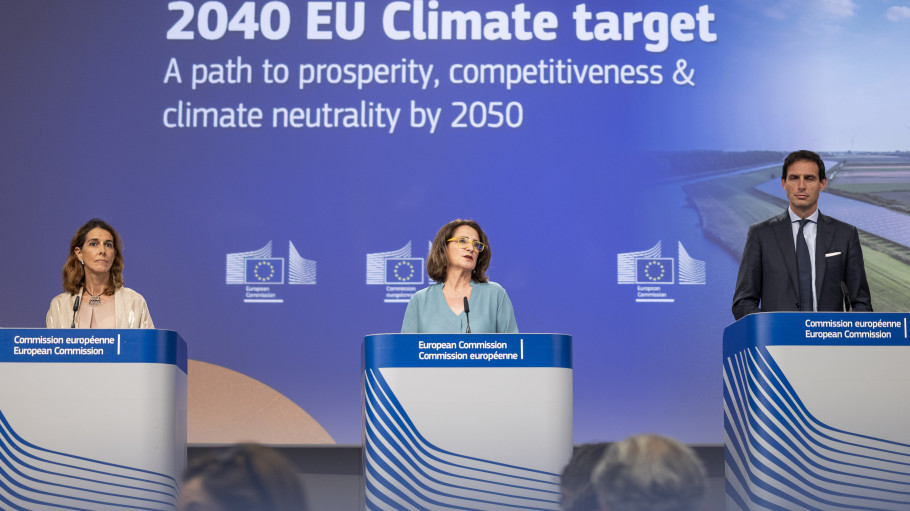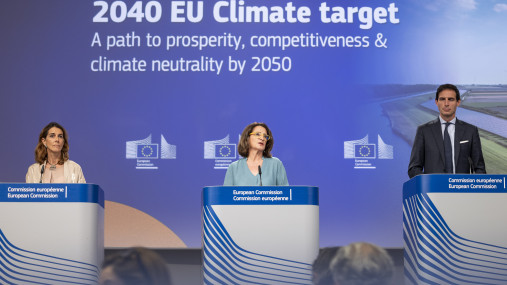
Press releases » The 2040 climate target requires an industrial revolution, but its enabling conditions - laudably recognised in the Steel and Metals Plan - are not there yet, warns EUROFER
The 2040 climate target requires an industrial revolution, but its enabling conditions - laudably recognised in the Steel and Metals Plan - are not there yet, warns EUROFER
Downloads and links
Recent updates

Brussels, 02 July 2025 – The 90% climate target proposed today by the European Commission demands an unprecedented transformation of EU society and industry in just 15 years. The European steel industry is already doing its part, but a viable business case for the transition is still lacking. To enable it, the EU needs to implement the Steel and Metals Action Plan much more decisively, delivering a highly effective trade protection against global overcapacity, access to internationally competitive low carbon energy and scrap, and a watertight CBAM, says the European Steel Association.
“The EU steel industry supports the EU’s climate neutrality objective by 2050 and has planned over 60 industrial scale projects that could deliver major emission reductions by 2030 - if they receive timely and effective support. As conditions are not there, many projects have already a delay, and some have been stopped altogether. In this light, a 90% headline target for the entire EU by 2040 risks becoming an illusion as it implies near-total decarbonisation of energy-intensive industries such as steel, of transport and households in just 15 years from now. That is a monumental challenge”, pointed out Axel Eggert, Director General of the European Steel Association (EUROFER).
“Steel production in the EU has plunged by 26 million tonnes in just six years, and investment levels remain worryingly low. To reverse this deindustrialisation trend, Europe must double down its efforts in implementing the Steel and Metals Action Plan, adopting a much more decisive and assertive approach. The recent Clean Industrial Deal State Aid Framework (CISAF) and today’s Communication on delivering the Clean Industrial Deal on CBAM exports acknowledge the existing challenges, but their concrete impact is very limited to reverse the industry’s downward trajectory. We are still waiting for the big decisions”, he added.
The effectiveness of the CISAF – highly reliant on national implementation - is also limited by overly rigid rules on cumulation, duration and conditionality. These constraints are counterproductive for the long-term horizon of investments in the most electro-intensive sectors like steel.
Today’s announcement on CBAM exports lacks the actual legal proposal and its design; CBAM sectors had proposed a simple mechanism, based on free allocation for exports. It is very uncertain whether the proposed mechanism based on CBAM revenues delivers a similar impact, also for the most export-oriented European companies. The EU steel industry exports over €25 billion worth of steel products per year and around €40 billion of downstream steel goods subject to CBAM.
“We are seeing a lively debate around the level of the target and its flexibilities, but not enough discussion on the worrying status of EU industry, whose decarbonisation is central for the achievement of the target. One thing must be clear: climate ambition must be delivered through innovation and investments in Europe – not through deindustrialisation. That will only be possible if the EU business case for the transition is swiftly supported by the necessary enabling policies. For steel, this is internationally competitive low carbon energy, stopping the global steel overcapacity that destroys the EU steel market, an effective CBAM preventing any form of circumvention such as resource shuffling, retaining ferrous scrap within the EU for the circular economy and setting European content incentives. We remain committed to working with EU policymakers to develop and implement such a consistent and supportive framework without delay”, concluded Mr. Eggert.
Photo credits: EC - Audiovisual Service
Contact
Lucia Sali, Spokesperson and Head of Communications, +32 2 738 79 35, (l.sali@eurofer.eu)
About the European Steel Association (EUROFER)
EUROFER AISBL is located in Brussels and was founded in 1976. It represents the entirety of steel production in the European Union. EUROFER members are steel companies and national steel federations throughout the EU. The major steel companies and national steel federation of Turkey, Ukraine and the United Kingdom are associate members.
The European Steel Association is recorded in the EU transparency register: 93038071152-83.
About the European steel industry
The European steel industry is a world leader in innovation and environmental sustainability. It has a turnover of around €215 billion and directly employs around 298,000 highly-skilled people, producing on average 146 million tonnes of steel per year. More than 500 steel production sites across 22 EU Member States provide direct and indirect employment to millions more European citizens. Closely integrated with Europe’s manufacturing and construction industries, steel is the backbone for development, growth and employment in Europe.
Steel is the most versatile industrial material in the world. The thousands of different grades and types of steel developed by the industry make the modern world possible. Steel is 100% recyclable and therefore is a fundamental part of the circular economy. As a basic engineering material, steel is also an essential factor in the development and deployment of innovative, CO2-mitigating technologies, improving resource efficiency and fostering sustainable development in Europe.

Brussels, 26 February 2026 — Europe’s steel industry has warned that the current draft Industrial Accelerator Act could direct public support for low-carbon steel to producers outside the European Union, unless lawmakers include and tighten ‘Made in Europe’ provisions.
Brussels, 24 February 2026 - Europe’s energy-intensive industries have set out a series of proposals to ensure that the EU’s upcoming Electrification Action Plan delivers on its objectives to stimulate and boost electricity consumption in industry. In a joint position paper, industries warn that persistently high electricity prices risk undermining industrial competitiveness and decarbonisation efforts. They call for a policy framework that will enable EU industry in pursuing decarbonisation and industrial competitiveness.
Energy-intensive industries (EIIs) provide direct employment to around 2.6 million people in the EU and represent the foundations of critical and strategic value chains for the EU economy and society. The current economic and energy outlook of the European Union is making investments in electrification and the continued business operation of our sectors at serious risk, should the energy-cost challenge not be solved.